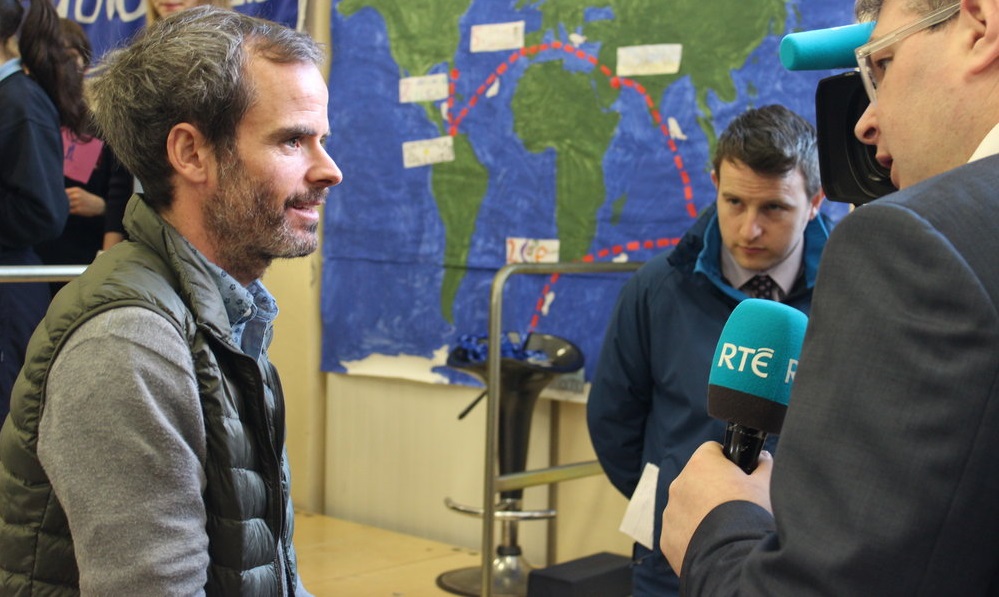
Galway teacher Gary Thornton has won the World Marathon Challenge, which involves running seven marathons in seven straight days.
Not only did Thornton win the challenge outright but he also won each of the seven individual marathons. These races were held across each of the seven continents throughout the world, starting in Antarctica on 30 January and finishing in Miami on 5 February.
The Galway City Harriers athlete ran two of his marathons under three hours posting times of 2:58:39 in Antarctica, 3:06:55 in Cape Town, 2:59:55 in Perth, 3:04:29 in Dubai, 3:19:28 in Lisbon, 3:35:31 in Cartagena, Colombia, and finally 3:21:19 in Miami.
Thornton and the other 47 competitors – 35 men and 12 women – had to clock up another 48 total hours of air travel to reach each of the starting destinations.
The World Marathon Challenge itself also has another link to Galway, with it being a Galway man Richard Donavon who first turned the event into a business in 2015. The event currently costs €36,000 to enter, and it was Donavon who sponsored Thornton covering his costs.
Before the event, Thornton tried to keep his involvement under wraps only telling his wife.
“I suppose I just wanted to keep it to myself, and if did tell my family they would probably be concerned. I only told them the week I was going,” he told SIN.
Thornton ran a combined total of 294 kilometres to complete the challenge, and has previously run a number of extreme races including events in North and South Pole and the Volcano Marathon in Chile.
Speaking to SIN just six days after he completed the challenge, the Claddagh N.S. teacher said doing these previous races benefited him hugely in the seven days, especially in the Antarctic.
“The last time I was in the Antarctic I overheated, which sounds kind of crazy because it was probably minus 20 last time down there, but I had too much gear on and I had the wrong footwear on down there as well,” he explained.
“This time I wore just my regular trainers. It definitely helped, because my time was nearly 40 minutes quicker than the last time I was down there”.
Thornton also has pedigree in conventional long distance running, having won the 10,000 metres national title twice and being a former cross-country competitor for Ireland in international competition.
In more recent years he has been racing in city marathons, and he stated his training did not differ much from his regular marathon training.
“I actually did go to the gym more, because I felt my legs and body were going to be under more strain, but that was the only change I made… I just kind of went with the whole attitude that you can’t really train specifically for something like this because it’s so out there”.
Despite emerging victorious, the challenge itself was far from smooth sailing for Thornton as it had numerous tricky elements for him to deal with.
“After one marathon in Rotterdam or Berlin or Amsterdam, you’re finished and you can take a few weeks off after training months for it, whereas with this you just come back, and hence that’s why the times are way slower than a single marathon. Add in the flights the jetlag, the lack of food in the system, and your body doesn’t know what’s going on,” he said.
Unsurprisingly, the successive days running 26.2 miles took its toll on the 37-year-old’s body running with an injured knee and swollen foot.
“When we got into Perth (for the third race), the race was on a Thursday night, and it was about 30k into that race that my right knee started to jar which had never happened to me before, said Thornton.
“In Dubai then, when we started the race my knee was totally wrecked, so I did one loop of the course and when I came back down I had to take some medication to get rid of it [the pain] before that race, and then in Colombia my foot was really expanded, and in Miami all of those things came together.”
The recovery period between races was also not ideal for Thornton.
“I wasn’t getting much sleep on the flights, but then again I suppose everybody has a different body and you react differently to things,” he said.
Thornton returned home on Thursday 8 February before being given a celebratory homecoming by his family, friends and senior infants’ class at the Claddagh N.S. on the Friday. His class has helped him come back down to earth, with their teacher himself hoping he can inspire them to one day chase their own dreams.
“It was great fun in school,” he said.
“All the kids in the school are really talented in some area, so hopefully if they can just keep going with what they’re doing or pick up something new because of what they’ve seen me doing, that would be great.”
Thornton said that in the future he may go back to racing individual city marathons but for now he’s taking a well-earned break with his friends and family for the next few weeks.
By Graham Gillespie
Photo used with permission of Claddagh N.S.